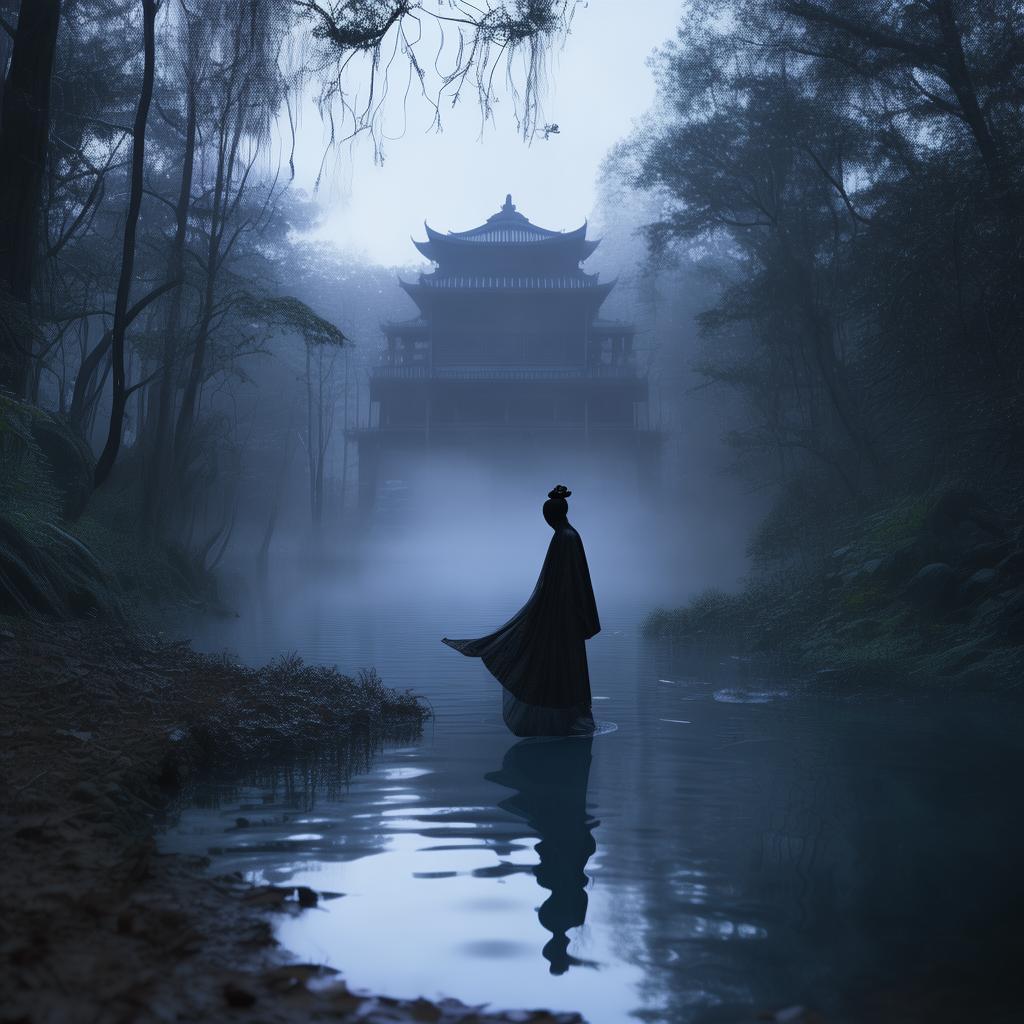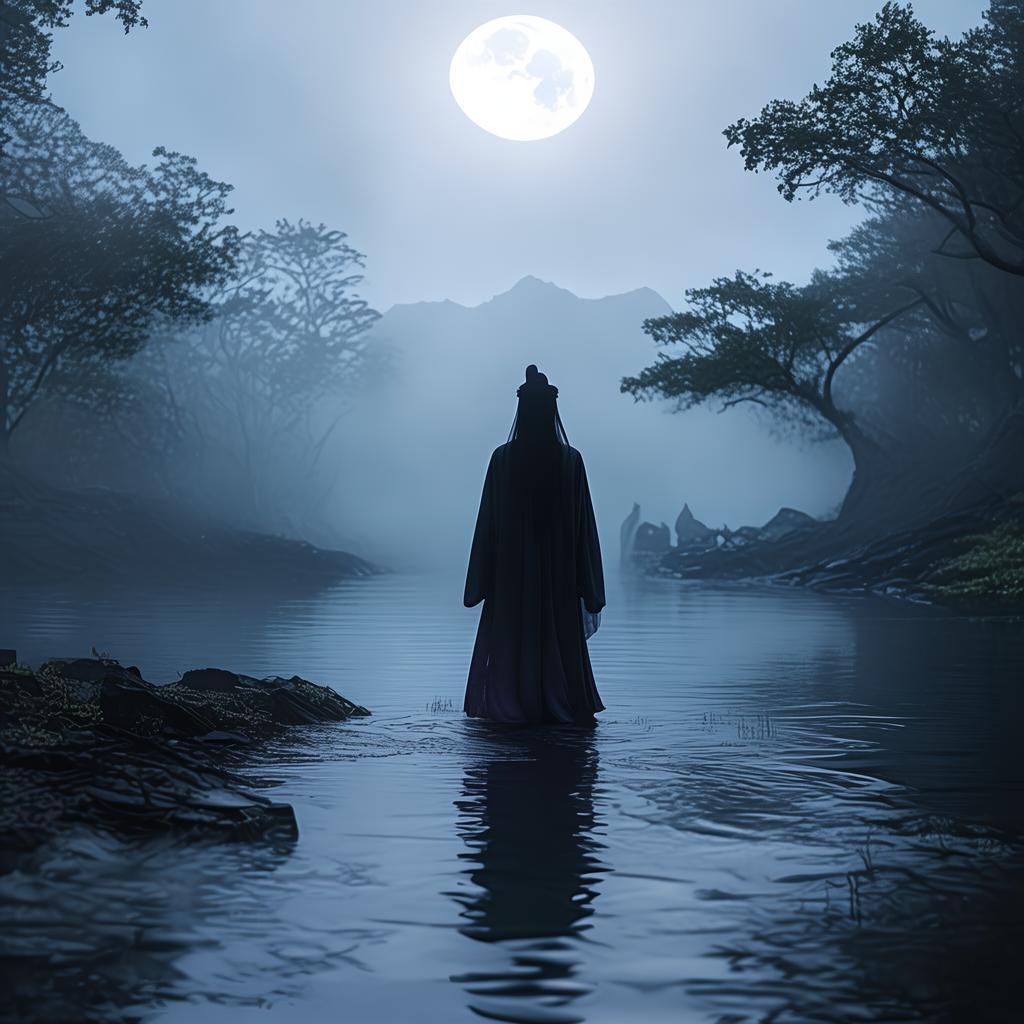The Labyrinth of the Otherworld
In the remote village of Qinglong, nestled between the misty mountains and the whispering rivers, there lived a young scholar named Ming. His name was not his own, for he had been given life by the spirits of the otherworld, bound to a mortal form to fulfill a destiny that none could foresee. Ming was a man of scholarly pursuits, but his heart yearned for the mysteries of the beyond, the whispers of the spirits that danced in the shadows.
One evening, as the moon hung low and the stars began to twinkle, Ming received a visitation. A specter, cloaked in the raiment of the ancient, appeared before him. "Ming," the specter spoke in a voice that resonated with the echoes of time, "you have been chosen for a journey. The labyrinth of the otherworld awaits you. Only by navigating its treacherous paths can you uncover the truth that binds your fate to the realms of life and death."
Ming's eyes widened with a mix of fear and curiosity. The labyrinth of the otherworld was a place of legend, a realm where the boundaries between the living and the dead blurred, and where the rules of nature were rewritten by the whims of the spirits. He had heard tales of scholars who had ventured into its depths, only to vanish without a trace, their spirits claimed by the labyrinth's insatiable hunger.
Undeterred by the specter's warning, Ming resolved to accept the challenge. He gathered his belongings—a tattered scroll, a small flask of water, and a single, ancient talisman—and set out at dawn. The path led him through the dense forests, where the trees whispered secrets of the past, and across the treacherous rivers, whose waters were said to carry the souls of the departed.
As Ming ventured deeper into the labyrinth, the landscape transformed into a surreal tapestry of the otherworld. The air grew thick with the scent of ancient incense, and the light dimmed to a haunting glow that danced upon the walls. The labyrinth was a maze of mirrors, each reflecting a different version of Ming himself, and he found himself questioning his own identity amidst the endless repetitions.
In the heart of the labyrinth, Ming encountered the guardian of the Otherworld—a creature of ethereal beauty and terrifying power. It spoke in riddles, its voice like the rustling of leaves in the wind. "You seek the truth, but the truth is a labyrinth of its own. Only by facing your innermost fears can you find the path to the truth."

Ming's resolve wavered, but he knew that he could not turn back. He had come too far, and the specter's words echoed in his mind. He must face his fears, for they were the keys to unlocking the labyrinth's secrets.
The guardian presented Ming with a series of trials. The first was a mirror that showed him his deepest desires, and the second was a mirror that showed him his greatest fears. Ming was confronted with the specter of his own ambition, and the specter of his own guilt. He was forced to choose between the pursuit of knowledge and the preservation of his own soul.
In the end, Ming chose the path of humility. He realized that the true power of the labyrinth lay not in the pursuit of knowledge, but in the understanding of oneself. With this newfound wisdom, he faced the final trial—the labyrinth's heart, where the spirits of the otherworld were said to reside.
There, in the heart of the labyrinth, Ming found the spirit of the Otherworld. It was a being of immense power and grace, and it spoke to Ming of the balance between life and death, between the material and the spiritual. Ming learned that his destiny was to bridge the gap between the living and the dead, to become a mediator between the realms.
The spirit granted Ming a boon—the ability to traverse the boundaries between worlds, to communicate with the spirits, and to heal the wounds of the living and the dead. In return, Ming vowed to protect the balance between the realms, to prevent the labyrinth from consuming the world.
With the labyrinth behind him, Ming returned to the world of the living. He was no longer the same man who had set out on his journey. He had become a bridge between the worlds, a guardian of the balance, and a keeper of the labyrinth's secrets.
The villagers of Qinglong marveled at the changes in Ming. He had become a sage, a man of wisdom and compassion. He used his newfound powers to heal the sick, to comfort the bereaved, and to protect the village from the threats of the otherworld.
And so, the legend of Ming spread far and wide, a tale of a man who had ventured into the labyrinth of the otherworld and returned with the power to shape the fate of the realms. The labyrinth, once a place of fear and mystery, became a symbol of hope and unity, a reminder that the living and the dead were forever intertwined, and that the truth lay not in the pursuit of knowledge, but in the understanding of oneself.
✨ Original Statement ✨
All articles published on this website (including but not limited to text, images, videos, and other content) are original or authorized for reposting and are protected by relevant laws. Without the explicit written permission of this website, no individual or organization may copy, modify, repost, or use the content for commercial purposes.
If you need to quote or cooperate, please contact this site for authorization. We reserve the right to pursue legal responsibility for any unauthorized use.
Hereby declared.









